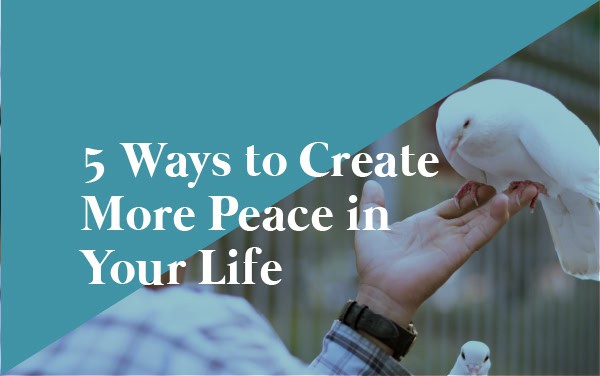
by Kerri MacFarlane | Jan 5, 2021 | Alcohol Relapse, Blog, COVID, Early Sobriety, Helpful Tips, Inner Peace, The first Year
I stopped making New Year Resolutions a few years ago. As positive, excited and motivated they would make me feel at the start of the year…oftentimes those very same resolutions would bring me down later in the year. It wouldn’t be long and I would feel like a failure for not following through. I would start thinking of myself as someone who just abandons their hopes and dreams. “Kerri, you suck.”, would play on repeat in my mind.
Counterproductive, to say the least.
Then a couple years ago, instead of making resolutions, I tried doing what I was seeing a lot of other people do. I would choose a word for the year. The chosen word wasn’t a resolution or a goal. It was more like a prayer or mantra, and I used it to help guide me in the daily actions and decisions (both large and small) I had to make. It was as if the word was a lighthouse helping to show me the way to a better version of myself.
As 2020 was coming to an end I started thinking about what my word for 2021 would be. I took me a little longer than it had in the previous years to decide on one. 2020 was strange, scary, hard, filled with uncertainty, unfamiliarity and loss. I kept hearing and reading posts and comments from people that just couldn’t wait to move past 2020, that it was a year they wanted to forget. Sorry to burst your bubble if you are in that camp…2020 is a year that will never be forgotten.
For me, if I were to pick a word to describe 2020 it would be WEIRD. And that was ALMOST going to be my word for 2021. Maybe that will be next year’s word. ?
This year my word is PEACE. ? 
Remember…this word is like a prayer or a mantra…I am using it to guide me. I want to create more peace in my life. I want to be more at peace with myself. It doesn’t mean I can just sit back, chant ‘peace’ over and over…and everything will change. I still have to do the work. Below are some of the things that I’m doing to help create and bring more PEACE into my life.
- Clear the clutter! Unclutter your living space, your work space, your mind. Ask yourself, does it bring you peace? If the answer ISN’T a HARD YES…then…get…rid…of…it! If it’s not serving you…get…rid…of…it! Clutter in your physical space, and in your mental space, creates chaos. Chaos is the opposite of peace. That is not what we want my friends.
I cleaned out my pantry and found spices that expired in 2003!! If it’s old and expired…get…rid…of…it!
2. Relax. Find a relaxation technique that works for you. A way to release and to recharge. It could be meditation, breathwork, long walks, yoga, running, music. For me it’s meditation, music and dancing…first thing in the morning. Find what works and do it.
3. Gratitude Changes Everything Every week during 2020 a dear friend of mine wrote down 1 good thing that had happened that week. She wrote it on a little strip of paper and tossed it in a jar. On New Years she read all those little strips of paper. I thought…what a cool idea! She admits that some weeks it was hard to come up with something. I mean think about it…we just lived through our first pandemic. I think that makes the exercise that much more powerful. Find something to be grateful for every week (I challenge you to do it daily.). I’m already looking forward to reading all my weekly strips of paper on New Years 2022!
4. Follow Your Bliss Before you can follow your bliss…you need to know your bliss. What makes you happy? Brings you joy? Brings you PEACE? Listen to your inner guide and take action on what brings happiness and joy into your life. The door to peace and contentment will open. My recent houseplant hobby is opening that door for me.
5. These things here could all be listed all on their own…but I wanted to give you more things you can start doing today to bring inner peace into your life.
- Set limits, boundaries
- Accept and let go
- Slow down
- Be 10 minutes early so you don’t have to rush
- Instead of guessing…ask, we are not mind readers
- Get outside
- Escape for a while – read a book, binge on Netflix
- Disconnect – screens off
- Laugh ?
Start with one thing and build on it over time. You can do this. We can do this.
“It isn’t enough to talk about peace. One must believe in it. And it isn’t enough to believe in it. One must work at it.” —Eleanor Roosevelt
Wishing you more happiness and PEACE.☮️
Until next time, be well.
Kerri Mac ??
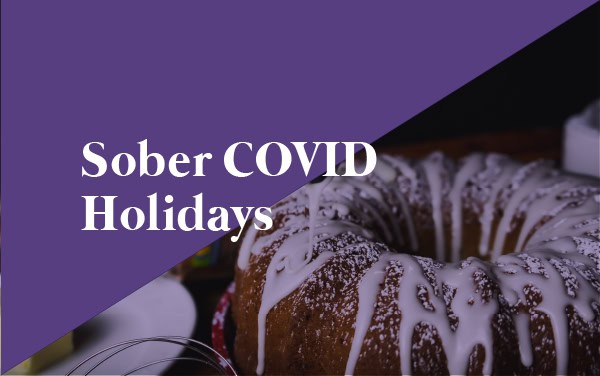
by Kerri MacFarlane | Nov 17, 2020 | Blog, COVID, Early Sobriety, Helpful Tips, Holidays, The first Year
A layered cake. That’s what I picture when I think about the next couple months. The bottom layer is the upcoming holiday season. And during a ‘normal’ year the holiday season can be stressful because…
…because of feeling overwhelmed, not getting everything on your todo list done. 
…because family. Nuff said.
…because your vision of what the holidays ‘should’ look like, looks nothing like what yours actually do look like.
…because what once looked so far away, the year’s end, is now right before your eyes…and you are still standing there with a list of unmet goals.
…because you’re lonely. You don’t do well in crowds. You’re exhausted. You’re broke.
Now take all that ‘normal’ year holiday stuff and add on another layer…a big fat layer of global pandemic.
Hold up…not done yet! Let’s go ahead and add one more layer…the “I want to stay sober through it all’ layer.
If you are newly sober, and this will be your first sober holiday season, you may be feeling a little (maybe a lot) nervous and anxious…that’s normal, and you are not alone. Stay with me here and we’ll get to some tips that can help.
For those of you that have some sober time under your belt, you know how good it feels, and what that inner freedom feels like, when you get through a holiday season alcohol free. These tips may help you too.
Self care is a must. You’ve ditched the booze! That’s a grande size of self care!! But there is more you can do in the self care arena, and taking care of your body, mind and soul is important during these stressful times. Healthy eats, plenty of water, enough sleep, physical activity, slowing down, stopping to breath, and making time for meditation. All very important and will help you get through the season. Here is a 5 minute meditation you can do anywhere!
Be mindful of what you’re drinking and thinking. (Not to be confused with ‘mindful drinking’, which is a movement I’ll explore in a later blog.) When headed to a social gathering or holiday party don’t go empty handed. Bring your own NA beverage or, if you know there will be NA options there get one right away. When you are prepared and have a beverage in hand people won’t be constantly asking you if you want a drink. Having a drink in your hand also helps you not look so awkward when you don’t know what to do with your hands.
Plan ahead. There are a number of simple things you can do ahead of time…before you get to the party…that will help reduce your angst. Drive yourself, so you can leave when YOU need to. Arrive late, leave early. Yes you are sober, but no that does not mean you have to be the designated driver, that can be triggering…drunk people are annoying (shocker!) and you may not like your drunk friends the next day. Have a friend or two on standby that you can call or text if needed.
You are going to be asked why, so have your response ready. “You’re not drinking? Why aren’t you drinking? For how long aren’t you drinking? You are never drinking again?!?!” They are going to ask…the questions will come. Because in this backwards society we live in, where drinking is the norm…if you decide to go alcohol free…you’re the odd one. You don’t owe anyone an answer. But not being prepared when this question is thrown at you can make the situation even more uncomfortable. Keep it short and simple if you want. “Why aren’t you drinking?” “Because.” The end.
Out with the old, in with the new…create new traditions. Change the setting. If you’ve always spent Thanksgiving dinner over at Aunt Mary’s…where you would have a little turkey with a lot of wine, then maybe you should offer to host the dinner at your house. Change the time. 4 pm Christmas dinner at the in-laws with all 20 cousins too much, try going over there for brunch. Do something completely different from your familiar holiday activities. Go volunteer at a homeless shelter or to walk the dogs at your local animal shelter. Giving and being of service is one of the best things you can do during the holidays, it helps you get out of your own head and focus on others.
First and foremost, make your sobriety your top priority, because it is. Every morning set your intention..tell yourself that you are not going to drink. No matter what. Eliminate the option of drinking altogether. Remind yourself why you made the decision to live a life without alcohol…and that your ongoing sobriety is the biggest, most important, gift of the season.
And always eat the cake.
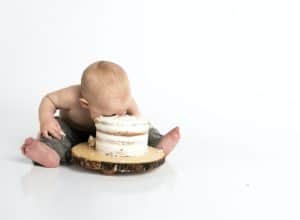
Until next time, be well,
Kerri Mac ??
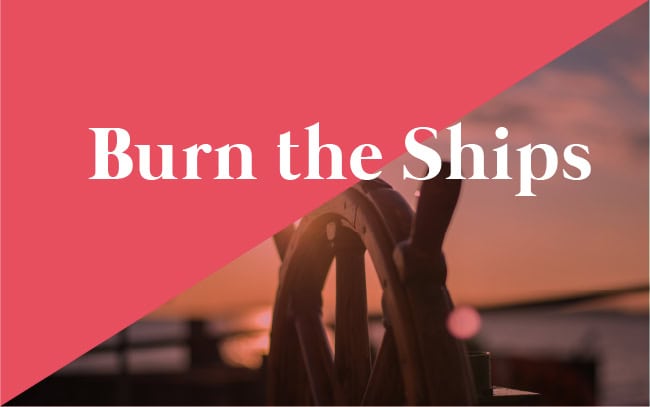
by Kerri MacFarlane | Oct 16, 2020 | Blog, Early Sobriety, Helpful Tips, The first Year
In the year 1519, Hernán Cortés, a Spanish conquistador, arrived in the New World with six hundred men and, upon arrival, ordered his men to, ‘burn the ships’. ?⛵️ His logic behind this wasn’t to go down in the history books as the conquistador loco that ordered his men to destroy his ships. Nope. It was to send a message to his men, a loud and clear message…
…there is no turning back…his men would have to conquer, or die.
Two years later, in 1521, Hernán Cortés conquered the Aztec empire. HIs ‘burn the ships’ strategy worked! Although, guys! His men didn’t even really burn the ships, they sunk them! ?? And that fun fact, my friends, wraps up our history lesson.
But there is a life lesson in this story that I do want to talk about. The story about Hernán Cortés, in its simplest form, is really just about commitment.
Retreat is easy when you let yourself have the option.
On February 15th, 2019, while attending my very first Recovery Elevator event, Nashville LIVE…I hit 100 days sober. I can remember how excited I was when I did the math and realized I would be there on that day. But I was also terrified! Flying across the country, alone, to go meet members from my online recovery community, that I only knew from Facebook…was stepping way outside of my comfort zone. It was scary, I was so nervous I almost canceled the trip. Strangers scared me. People scared me.
At that point in my sobriety, counting days was very important to me. There were days, even weeks, in the beginning, when counting those days was all I could focus on. But that got me to day 100. The first day 100 in many, many years.
Knowing myself, and finally being honest with myself, I knew that I would have to do something more than count days and read quit lit if I was going to make it another 100 days. I needed more accountability and I was going to have to get uncomfortable. So I bought that plane ticket to Nashville. And I secretly made plans to publicly share my milestone of 100 days sober on social media.
It’s not just a coincidence that my 100th day fell 100 days after my (last?) rock bottom moment. I’m not going to go into anymore of my story right now, if you’re curious you can listen to my interview – Recovery Elevator Episode 255.
When it came time to press “Post” I was a mess of sweaty, shakey, nerves. Even admitting to the people that knew, from personal experience, of my drinking problem was hard. I was embarrassed, filled with shame and guilt. My anxiety was still at an all time high, almost paralyzing at times.
There is this stigma associated with addiction, and too often it keeps people from admitting they have a problem or from seeking help. The word ‘alcoholic’ brings up images of a person living under a bridge, drinking from a brown paper bag.
I often felt damaged, defective, less than. I knew that in order for me to move forward in life, to break the cycle I had been on, that I would have to do something drastic.
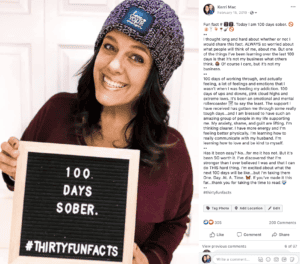
This public post on Facebook was my ‘drastic’. ??
I have never regretted posting it. As I started getting the notifications from comments and likes I was afraid to go read them. When I finally did I wanted to cry. Happy tears. ? Grateful tears. I was overwhelmed and speechless by all the positive, encouraging, supportive and ‘I can relate’ messages that I got. I was shown nothing but love.
This single scary ‘burn the ships’ post 100 days in busted down the door and has made it easy for me to continue to share my journey. Using my story and my voice helps keep me in check, and it helps others know that they are not alone.
Fast forward to today…In the few days before sitting down to get these words out I was doing a lot of thinking about my 100 day post, trying to remember the way I was feeling, what emotions I was experiencing. What quickly came to mind was how scared I was. Putting yourself out there like this, being vulnerable like this, is scary. And once it’s out there…once that ship has been burned…it can’t be unburned! But that’s the point, right? I knew I had no other choice, I had to take action. If I didn’t, nothing would change. Even though I really wanted to get sober and live a life without alcohol, I was too scared to leave the comfortable and familiar. Burning the ships gave me the courage, strength, and the push, to step into a new life.
Have you burned your ships? Or do you always give yourself a way out?
It doesn’t have to be a public blast on social media like I did. That was a level 5 on the Burnometer! ?
There are different levels of burning the ships. Start with level 1, work your way up! They all will help establish another layer of accountability for you.
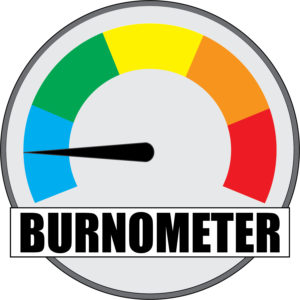
Level 1: Someone you don’t know well. This could be a store clerk, a barista, a friend from book club, but not a stranger.
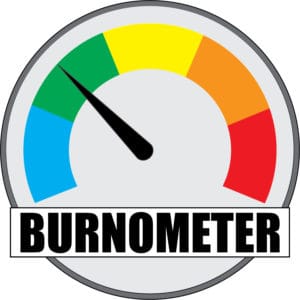 Level 2: Someone you consider a friend, or who you have regular monthly interaction with. This is an acquaintance from the gym, a neighbor, restaurant employee.
Level 2: Someone you consider a friend, or who you have regular monthly interaction with. This is an acquaintance from the gym, a neighbor, restaurant employee.
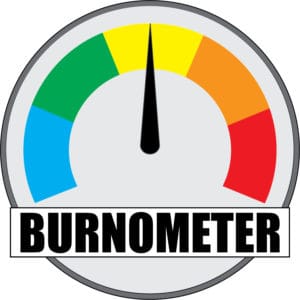 Level 3: This is someone you interact with on a weekly basis. Co-worker, good friend, running partner, or hiking friend.
Level 3: This is someone you interact with on a weekly basis. Co-worker, good friend, running partner, or hiking friend.
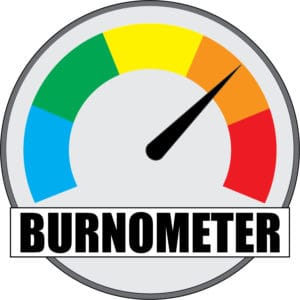 Level 4: Meeting with a close group of friends, family, spouse, in person conversation. Immediate family.
Level 4: Meeting with a close group of friends, family, spouse, in person conversation. Immediate family.
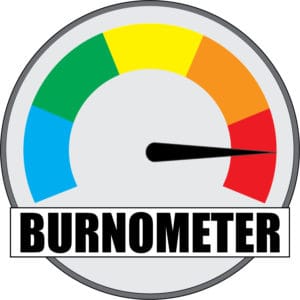 Level 5: FB Live, Podcast, Social media post, family meeting, airplane with banner in the sky.
Level 5: FB Live, Podcast, Social media post, family meeting, airplane with banner in the sky.
I challenge you to pick a level above, find someone that fits the description…and burn baby burn. ?
Please come back and share your experience with me!
Until next time, be well.
KMac ??
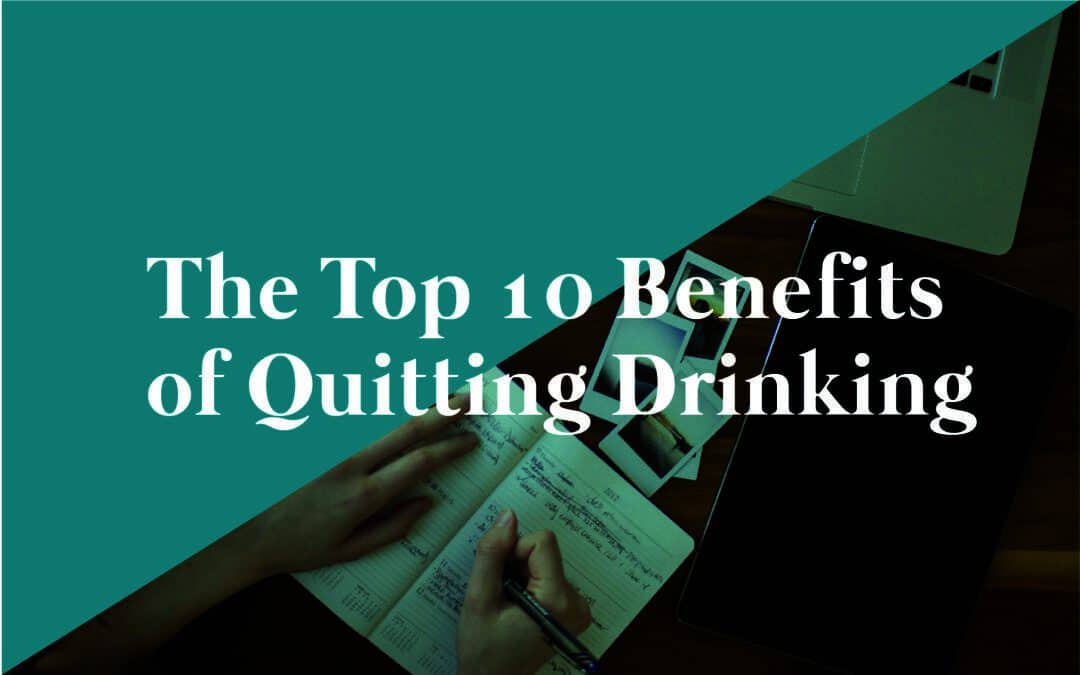
by Kerri MacFarlane | Sep 18, 2020 | Alcohol Relapse, Blog, Early Sobriety, Helpful Tips, Resources, The first Year
?? Hi, my name is Kerri Mac. Some of you may know me, but I’m betting that most of you don’t. I want to thank you for taking the time to read my blog, my very first blog.
How did I end up here, writing a blog for Recovery Elevator? Well, I like to think of it as though I graduated. Two years ago I started writing the show notes for the podcast. And now, here I am…writing blogs. I have been a member of Café RE for over 2.5 years and that has changed my life. But that’s enough about me, for now. ?
I want to talk about the benefits of quitting drinking. And not the obvious ones, like the health benefits or the money and calories saved. No, I want to go a little deeper, and more niche…and I want to make a list…because who doesn’t like a list?
Let’s call our list, The Top 10 Benefits of Quitting Drinking. Catchy, right?!
Here we go…
1 – Your authentic self will begin to emerge. I say begin, because this isn’t a one and done thing, and it takes time. That’s what recovery is, recovering the person you were meant to be and giving the inner child permission to come out and play again. This authentic self fully recognizes that the mind makes life out to be way more serious than it actually is. In fact, don’t forget Rule 22, lighten up and never take yourself too seriously. When you ditch the booze there’s a good chance you’ll find yourself rolling sideways down grassy hills.
2 – You’ll have the chance, the opportunity, to find out why you’re using alcohol to dull that internal discomfort. We’re talking about getting at the roots of this discomfort. No quick fixes or fads, but doing some serious soul work where we make that long journey from living in the head to the heart. This one isn’t so much a benefit, but a life mission and why we’re here.
3 – You’ll begin to find out who you aren’t. Ahhh, you thought I was going to say find out who you are, didn’t you? Nope. And in terms of finding out who you are, I encourage you to rid yourself of this lifelong pursuit because when we quit drinking, the opposite happens. We find out who we are by a series of finding out who we aren’t. Do you dig? Does that make sense? The “who we are” will organically be uncovered by a sequence of revelations of who we aren’t. For example, I’m not a girl who likes to stay up until 2 am and sleep in late, quiet early mornings are my favorite. It’s more common, than not, to find me awake at 4:00 AM…journaling or meditating. You’ll learn you’re a strong person, deeply rooted in this world, who doesn’t need an external substance to feel good internally. Those days will be gone. Hasta la vista, baby! ✌?
4 – You’re open to signs from the universe. Whether you believe they are coming from God, Allah, galaxies, the willow tree in your front yard, or your neighbor Tim, you won’t miss them because you’re drunk or hungover the next day. Hooray! ??♀️??♀️
5- You can see the insanity of the mind. The Hindus called the natural dysfunction of the mind Dukkha, Buddhists call it maya and Christians call it original sin. You’ll also be able to take a step back, become the observer of the mind, and recognize this insanity. Here is what you’ll be able to see. Studies also show that of the 60,000 – 70,000 thoughts we have a day, 90% of them are equal or the same as the day before. ?
-
- It’s these repetitive thoughts that always drive you to make the same decisions.
- It’s these familiar decisions that always lead to the same actions.
- It’s these familiar actions that always result in the same outcomes
- It’s these same outcomes that constantly result in the same emotions
- And these familiar emotions give you those familiar feelings.
- And it’s these feelings that always lead to the same thoughts – thereby completing the cycle. You can now recognize this and will be empowered to change your thinking.
6- Your brain will start to produce regular amounts of Melatonin again. Melatonin is produced by the pineal gland in the brain and simply lets your body know that it is night-time so you can relax and fall asleep. There’s an important word in there. It helps us RELAX when our outer environment says it’s time to relax. Studies show that regular alcohol intake drastically reduces the amount of natural melatonin the body produces which, as you can imagine, does a number on your sleep! ?
7 – Welcome back Oxytocin, or the connection molecule. Oxytocin is produced in the hypothalamus and is sometimes referred to as the “love hormone” because levels of oxytocin increase during hugging and orgasm. It may also have benefits as a treatment for a number of conditions, including depression, anxiety and intestinal problems. This is the molecule that allows us to build altruistic relationships with other human beings. When oxytocin is present in the body, we are living more in the heart area and less in the thinking mind. Studies show that pregnant women who have higher levels of oxytocin bond more strongly with their babies after they are born according to a 2007 study in the journal Psychological Science.
8 – You’re part of something MUCH bigger. We all want to feel like we’re contributing to something, that we are adding to a project or goal and making this world a better place. People are ditching the booze more than ever these days and this global movement takes warriors like you. The bigger picture is that we are no longer looking externally for inner comfort. That’s really what is taking place, and you’re a big part of raising the consciousness on the planet. In fact, when we struggle with addiction we think we are in the back of the line in terms of success and achievement, but in reality, we are the ones who are forced to look within and make HUGE life changes. We are paving the way for others.
9 – You stop hoping. Yep, hope is the problem. When we are hoping for something to change, be it our inner emotional state, the weather, or whatever…then we stop denying what is. This incessant hoping for something to be different drives addiction and is doing a number on humanity. The Buddha noticed this 2500 years ago in Lumbini, now modern day Nepal, when he links all human suffering to craving or hoping for something to be different. That guy was so far ahead of his time.
10 – You’ve got a chance to work on the one big lesson you signed up for in this lifetime. There’s a theory that you’re supposed to work on one major issue in this lifetime. Mine is connection. For others this can be letting things go, loving yourself, standing up for yourself, showing unconditional love to others, forgiveness, self-sabotage, facing fear, patience, shame, regret, and the list goes on. When our veins are flowing with alcohol, there’s no chance we’ll build the internal circuits around these issues. And there’s another theory, that if we don’t get to it in this lifetime, then well, you’ll start again next life. So why not get started now and start tackling the number one thing that is holding us back.
These types of lists are hard. It could easily be the top 100 benefits of sobriety. I challenge you to create your own list and then another one when you hit another milestone. Go back and see how they have changed. The first time I did a list like this, most of mine were external, now they are mostly internal. We are constantly evolving and changing as we walk this journey.
Until next time, be well.
KMac ??

by Paul Churchill | Apr 13, 2020 | Blog, Helpful Tips, Resources
Those in recovery have a head start. We’ve already begun the inner transformation that so many are just starting. This is a fun concept everyone that I get super excited about. It’s a deep one. I think you’ll understand why and I want you to come with me. I think you’re ready. I know you’re ready.
But first… Here is a long list of countries, capitals, and cities that have shut down the sale of alcohol, and don’t recognize them as essential businesses during the COVID. I hope you’re comfortable, this is a LONG list, I mean, get ready to be here for a while.
Cheers to South Africa (closed until April 16th), Nuuk, the capital Greenland, and the town of Aisne France (they cited an increase in domestic violence in homes which led to this decision).
The “long list” part was a joke. My goodness. If that’s not a wakeup call, I don’t know what it… And this is a precursor to where this post is going.
Essential Businesses
I first want to cover why liquor stores are considered essential businesses… I know many of you have sent me emails wondering the same… And here’s why.
The Mayor of Denver Colorado reversed his call of closing all liquor stores on March 23rd just two hours after announcing that liquor stores would close during the quarantine. I read a long article in the Denver Post the other day on why the quick reversal. It cited keeping jobs intact, preventing more unemployment claims, which all make sense. However, the most accurate response came at the end, which said, “the last thing we need right now is a bunch of people taking up hospital beds with for alcohol withdrawals.”
And there you have it. It’s that simple. Our society has found ourselves in such a pickle, that for many, pharmacies and liquor stores are contemporaneous or interchangeable. This has to change. It is changing.
Where have I heard that before?
The other day I was on the phone with our contact at the hotel in Denver for our upcoming event this June. I asked her how she was doing during the pandemic, and she said, “well, I’m taking it one day at a time.” “I bet you are,” I said… Now where I have heard that before? The big book of Atlas Shrugged? The Chronicles of Narnia?
Then a couple of days later, I dropped my bike off for a tune, which for sanity purposes is deemed an essential business in Colorado, and I asked the guy how he is doing. He said, well, it’s one bike at a time, and we’re all taking it day by day. I respond with, “You don’t say…”
Where have I heard these before? These are classic twelve-step program analogies that we’ve been using for decades. Fifteen years shy of a century, in fact. I’m like, “is everyone working a twelve-step program these days?” Not everyone, but more now than ever. Including those who don’t struggle with alcohol and aren’t aware they are even working the program.
So here is where we have a head start. We got started early with connecting the heart and soul internally, regardless of external circumstances. On building inner peace without a foreign substance such as pinot grigio, IPA’s, cigarettes, or donuts… Ahh. I’m not ready to give up donuts yet, but I think you get it.
In our own personal jail
Millions of people feel like they are locked up in their houses right now, in jail, inside their own homes with their families. I FaceTimed with my brother and his family yesterday, and they are STRUGGLING. His wife is pregnant, they are both working from home, and my 3-year-old nephew is no longer at daycare during working hours. My brother said he’s going crazy without his routine, the gym, working from home, and boredom.
Okay, here is where I encourage you to go deep with me. Are you ready? At my talk in February 2019 at our LIVE event in Nashville, I said that alcohol is an invitation to wake up. To recognize that real, long term happiness can never be tied with the external physical world. This could be a life partner, a pet, a spouse, a job, a house, or your ride on John Deere Greene lawnmower. Side note, the country artist Joe Diffie, who wrote the song John Deere Greene, recently passed away due to the Corona Virus. Guys, this shit is real.
We, who grapple with addiction, choose to receive this invitation early. As we are the primary wave, who have decided to do the inner work first and show the way for the rest of humanity. COVID 19, is the invitation for another wave to follow. Now, I may have just said some words that furrowed a brow or two. That was that we “choose” to receive this invitation, and we “decided” to do this inner work first. As in it was voluntary.
That’s a whole bundle of spirituality that I want you to think about for the rest of the day… to start sitting with. We had a webinar a couple of weeks ago titled “Spirituality and Addiction,” and this was the point that spiritual teacher Elaine Huang made. She said, “those who have the courage to go within and build inner stability without alcohol are paving the way, are leaving a footprint in consciousness for the rest humanity who are soon to follow.”
Now, this next part isn’t food for thought, but a concept that I believe in with all my heart. I’ve said this in previous episodes, in my book, at past retreats, and it’s more applicable now than ever.
Due to the stigma surrounding alcoholism and addiction in general, we often mentally shame ourselves to the back of the sociological cue. Telling ourselves that we have morally failed, that we messed up in life, and this couldn’t be further from the truth.
We are the teachers
In fact, we are the ones who said, “Okay, I guess I’ll quit drinking, do a bunch of internal work, find stability and then I’ll show my neighbor, cousin and brother Rod who don’t have drinking problems, how to build a sturdy internal foundation of joy that doesn’t care if the Seattle Seahawks win the Super Bowl or not.
Do you follow? These are expansive ideas that I hope you sit with, and lord knows many of us have found ourselves with more time to sit…
Okay, one more point about how we have a head start. If you’ve been around the recovery block, you’ve heard that gratitude is key to departing from an addiction. It’s INCREDIBLY important, and here’s a cool way that science shows how. It also hints at how we need inner change as opposed to vaccines to address COVID.
Like any other virus, (COVID-19) has a low vibration with a closed electromagnetic circuit structure, with a resonance frequency of approximately 5.5 Hz-14.5 Hz. In the highest ranges, it is not active and, starting with the ranges of 25.5 Hz and above, the virus dies…
These are low vibrations. For reference, fear has a vibration from 0.2 Hz to 2.2 Hz. Resentment, 0.6 Hz to 3.3Hz. These emotions or frequencies don’t feel good to experience, and I bet it doesn’t feel good to have the coronavirus.
Again, the virus dies above 25.5 Hz. A genuine thank you, or gratitude has a frequency of 45hz. Compassion for another 150Hz. And unconditional, universal, sacrificial love is at 205 Hz. When we practice gratitude and compassion, COVID, can’t survive in that environment. A micro at the cellular level that is being applied to the macro.
-Paul Churchill
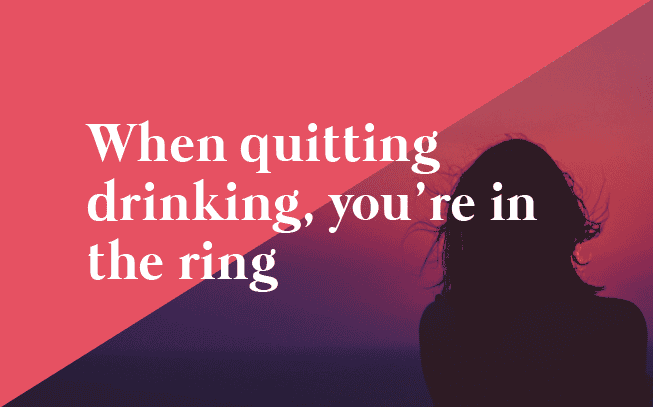
by Paul Churchill | Mar 15, 2020 | Alcohol Relapse, Blog, Early Sobriety, Helpful Tips, The First 24
I’d like to zoom out a bit and talk about the journey for a moment. There is no one size fits all approach to ditching the booze, but I think most of us can agree, there can by trying times. You often hear on the Recovery Elevator podcast from myself and interviewees how incredible a life without alcohol can be, which I can attest to. Still, the pathway can be complicated at times, and for reasons unknown, more challenging for some.
There is a comfort knowing you’re not alone. That you’re not the only person on the planet, who struggles with alcohol, which is how I felt when I first began my journey early last decade. There is also a comfort knowing that collectively, people find this pathway hard. The pains and painful moments are all part of it, and you’re not alone. Keep in mind, of the roughly 100,000 genes we inherit, not of them is the addiction gene, and you can reverse this progression.
Right now, since you’re reading this, it places you in the ring. You’re an active participant in the game of life. You’re in the center of the ring, and not up in the grandstands observing. And you’re an absolute badass, for purposefully placing yourself in this ring where there’s a good chance, almost certain chance, you’re going to get dirty. Smacked, kicked, punched, rolled over on, and a lot of other unpleasant things. This isn’t you saying, well, I’m open to failing, it’s you saying, I’m going to fail as many times as I need to be successful.
I admire each and every one of you for consciously choosing the enter the ring. Seriously. It’s impressive. I applaud all of you for continuing to listen to the podcast even if the message hasn’t quite “hit home” yet.
Now, to be fair, by electing to be here, living life on planet earth places you in the ring, so everyone is more or less in the ring. But your decision to move forward in life without alcohol, to address what’s holding you back in life, places you in the center of the ring and not way up in the upper decks as an observer. Your conscious decision to depart from the booze, from what provided relief, from what used to make your job, anxiety, depression, shame, guilt, winter, your neighbor Tom, and individual relationships bearable places you front and center of the ring.
You might be saying, “wait a second Paul, I haven’t told anyone about my decision to quit drinking.” Well, even if the only ship you’ve burnt is with yourself, which is where it starts, you’ve still taken the most essential step in your life. This is what makes you brave… courageous… valiant… daring… vulnerable… adventurous… and a bold leader.
Now you may have heard courageous and vulnerable in the same sentence, and that’s no coincidence because they are the same damn thing. And Deep down, you know, the only way out is through. And to go through, you get cracked open, in the most beautiful of ways. It’s almost like a vulnerable sandwich. First, we must be courageous enough to be vulnerable. Then we must be courageous again to address the vulnerable parts. The vulnerability sandwich. I like it, I will personally be adding some horseradish mayo or honey mustards. I’m a huge sauce guy.
Now let me describe what the ring looks like… Imagine a bull ring from Spain. One that Ernest Hemingway would write about in the “Sun Also Rises.” When you stop running, turn, and face your fears, you just made the conscious decision to place yourself in the center of the ring. Now, as I said before, everyone is in the ring, but you just came down from row 55, which is near the top and are now inside the ring. You can still get shoved around while sitting in the top row of the stands, and there’s a slim possibility you’ll to confront a bull, but by sitting way up there, you’re well in the comfort of your comfort zone.
Apart from the occasional shirt getting launched up there from a t-shirt cannon, not much happens. It’s a bunch of people who are living behind screens which have mighty thumbs and can type whatever they want. Up there, where you used to be, It’s called the sidelines of life. Where all you have is talk, inaction, and empty goals. How does that saying go? Talk is inexpensive? Talk is a bargain? Talk is of lesser quality… Talk is cheap. Got it.
So here you are, inside the ring. You look down to find your shoes are covered in dust. You suddenly feel smaller. Things don’t smell quite right. And you see large bulls running around. You see swords, bows, and arrows, spears, dinner parties where alcohol is flowing freely, your best friend Aaron is offering you a vodka cranberry. You don’t have things figured out. You recognize it’s only a matter of time before you get your ass kicked.
As I mentioned last episode, it’s not about avoiding these ass-kickings in life; it’s about getting up and back into the ring. I think I’ve done a fair job of accurately describing what this journey will be like. I cover this specifically in episode 250 titled “Is Sobriety all Unicorns and Rainbows.” Sure, after alcohol, a new life awaits, one without crushing hangovers and self-loathing, but when in the ring, there will be challenging days. Moments you don’t think, keyword think, you’ll be triumphant, but you are. You find the strength because it’s there. I know it’s there. It always has been.
Let me read one of my favorite quotes of all time for you. One that I had framed and hung up on my wall before the very FIRST episode of Recovery Elevator podcast dropped on February 25th, 2015. I remember looking up at the framed quote on the wall, them uploading episode 001 to iTunes and then said to myself, “Oh shit, here we go.”
“It is not the critic who counts; not the man who points out how the strong man stumbles, or where the doer of deeds could have done them better. The credit belongs to the man who is actually in the arena, whose face is marred by dust and sweat and blood; who strives valiantly; who errs, who comes short again and again, because there is no effort without error and shortcoming; but who does actually strive to do the deeds; who knows great enthusiasms, the great devotions; who spends himself in a worthy cause; who at the best knows, in the end, the triumph of high achievement, and who at the worst, if he fails, at least fails while daring greatly, so that his place shall never be with those cold and timid souls who neither know victory nor defeat.”
– Theodore Roosevelt.
I think Teddy does a damn good job of summarizing just what level of Ninja status you’re at. You’re in the ring, which is all that matters. Now the thing you’re probably saying to yourself is this. “Teddy’s right. I don’t care what others think about me.” Say it to yourself, it sounds good. It feels good. But how come when we get criticism, it usually stirs up a whirlwind of emotions in some part of the body? You’re like hang on, I just told myself, I don’t care what others think about me, but how come there’s a knot the size of a grapefruit in my solar plexus? It’s because we’re wired as human beings to care.
We are genetically hardwired to care what others think about us. The reason why is we need a tribe. We need a community to survive. Okay, so here’s where I can add comfort. Criticism is normal. In fact, it can be a barometer knowing you’re on the right path. How does it go? Haters gonna hate, hurt people hurt people… Blah to them. We’ve covered countless ways on this podcast to stay grounded, to no let others affect your energy, but let’s be honest, some of it still hurts. It always will, and that’s alright. Allow yourself to feel it, and I can promise you with a capital P, alcohol will only create another, more ferocious critic.
Now, who’s the critic? Who’s the person saying you’re not worth it, or you don’t deserve this, or don’t even try because you’ll never make it? It’s not who we think it is. Stick with me for a second here.
The spectator, or the critic we’re thinking about, the one we imagine sitting in the stands, heckling from above, in the comfort of their seat, is mostly quiet. Why? The spectator respects you, admires you, is almost envious of you… for your decision to be the most authentic version of yourself because deep down, they want the same. They want you to succeed. Sure, you may get the occasional cackle or low blow from above, but even they are saying, “go, go, get back up and get it, girl. DO it. Show us how. Lead the way.” They all want you to find traction on this journey.
The loudest critic
So who is the critic when you’re in the ring grappling with alcohol? Who is the one that places the most seemingly impenetrable walls on your path? Wait for it… It’s you. I’m 99.99% sure the worst critic is you. The constant voice hurling those vitriolic painful volleys and insults is coming from you, or the voice inside your head.
So this is good news. You can’t control disapproval from the outside, and well, you can’t really control the thinking on the inside either, but with awareness, you start to rewire this inner critic to be your inner cheerleader. Your biggest fan. A coach when you need it most.
The way you do this is becoming more conscious than ever of the unconscious self, and when thoughts come across the mind that says, “Michelle, let’s not even try, we won’t make it.” Say, “thank you for your input,” That’s it. That’s the equivalent of a tomahawk throw into an opponent in the ring. With awareness, and one departure from those unhealthy thoughts at a time, you begin to tune out this critic, you stand tall. You move forward in life without the poison called alcohol.
You can do this, I know you can. You’ve been doing the heavy lifting for quite some time now. You are up to this task, I know you are. Come on, we both know you are. Being in the ring is scary at first, terrifying, but with time, you’ll find comfort there. Even enjoy it. Welcome it. All of it.
Keep in mind, you’re the one with dust on your face, or for us, sometimes with puke in your hair. It’s you that’s in the ring, not the external critic. You’re the relevant one.
Keep trying, you’re so close
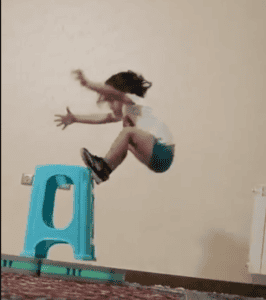
Check out this video of this you gal who can’t be more than 4,5 or 6 trying to jump up onto a block. She keeps trying and keeps failing. This block is hitting her in the chin, she’s falling over, but she keeps getting back up into the ring. And then, after heaps of jumps, she gets it. Just like you will.
I got the idea for this episode after I got a couple of emails from listeners who were ready to give up. To accept defeat and exit the ring entirely and surrender to a life of drinking and misery. HANG WITH ME. I’m going to ask the readers a question.
Was there ever a moment when you could have sent that same email when you were ready to quit? Hang on,,, okay, every single reader who has ditched the booze or is in the process just nodded their head. SO, if this is how you’re feeling at the moment, know it’s completely normal, some call it the dark night of the soul. Which means you’re so close. So promise me to stay in the ring, for as long as it takes. Do you know who else is in the ring with you? Me, and let me tell you, the other side… is much closer than you think.













